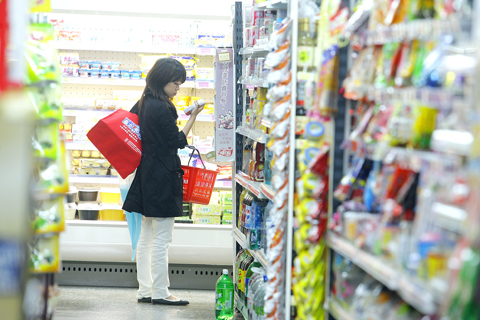The nation’s consumer price index (CPI) dropped 0.86 percent last month from last year on weak demand amid the economic downturn, the Directorate-General of Budget, Accounting and Statistics (DGBAS) said yesterday.
The statistics agency also published a series of living cost indexes for the first time, showing that prices for food and other necessities were slightly higher than their average prices last month.
“Commodity prices continued to drop compared with last year because of a poor economic climate, though the price of fruits and vegetables has remained stable,” DGBAS section chief Wu Chao-ming (吳昭明) told a media briefing.

PHOTO: CNA
This was the eighth straight month the headline inflationary gauge contracted as the recession slowed economic activity and retailers lowered prices to boost consumption, the latest CPI data showed.
Transportation prices reported the biggest fall, at 4.03 percent, as energy costs remained relatively high in September last year after crude oil hit US$147 a barrel in July last year. Wu said the swine flu pandemic contributed to shrinking transportation costs as people cut down on travel.
Household living costs saw a 1.93 percent decline, mostly on lower utility rates compared with last year, while entertainment and education costs dropped 2.79 percent on price cuts by retailers, the report said.
The core CPI, used to forecast long-term inflation trends by excluding energy, vegetable and volatile-priced commodities, dropped 0.93 percent, the fourth monthly contraction, the report said.
The figure is likely to stay in negative territory for the rest of the year, although GDP is expected to regain positive cyclical movements this quarter on improving economic signs.
The wholesale price index declined 9.59 percent year-on-year last month as global prices for metals, chemical and oil products dropped, the report showed.
Meanwhile, the DGBAS released its first living cost indexes in line with Premier Wu Den-yih’s (吳敦義) concept of a grassroots economy.
The first category index, under which food costs carry a weight of 80 percent, stood at 109.12 points last month.
This was higher than the CPI index of 104.24 points, although it dropped 0.55 percent from last year, the report said.
The second category index, which combines food costs with education and entertainment prices, reached 106.39 points and dipped a yearly 1.26 percent, the report said.
The third category, comprised of 239 commodity items usually purchased once a quarter or sensitive to price fluctuations, retreated 0.72 percent annually to 107.08 points, the report said.
The statistics official said the living cost indexes could establish better links between commodity data and the daily life of the common people, who may not buy certain goods and services despite price cuts.
Separately, major domestic hypermarket chains Carrefour Taiwan (家樂福), Far Eastern Geant Co (愛買) and Wellcome Supermarket (頂好超市) said vegetable and fruit prices remained virtually unchanged as of yesterday, with many customers going grocery shopping prior to the weekend’s Moon Festival.
The Council of Agriculture said in a press statement yesterday that heavy rain in northeastern Taiwan brought by Tropical Storm Parma had had a limited impact on vegetable and fruit supplies as most farmland is located in the south.

Quanta Computer Inc (廣達) chairman Barry Lam (林百里) is expected to share his views about the artificial intelligence (AI) industry’s prospects during his speech at the company’s 37th anniversary ceremony, as AI servers have become a new growth engine for the equipment manufacturing service provider. Lam’s speech is much anticipated, as Quanta has risen as one of the world’s major AI server suppliers. The company reported a 30 percent year-on-year growth in consolidated revenue to NT$1.41 trillion (US$43.35 billion) last year, thanks to fast-growing demand for servers, especially those with AI capabilities. The company told investors in November last year that

Intel Corp has named Tasha Chuang (莊蓓瑜) to lead Intel Taiwan in a bid to reinforce relations between the company and its Taiwanese partners. The appointment of Chuang as general manager for Intel Taiwan takes effect on Thursday, the firm said in a statement yesterday. Chuang is to lead her team in Taiwan to pursue product development and sales growth in an effort to reinforce the company’s ties with its partners and clients, Intel said. Chuang was previously in charge of managing Intel’s ties with leading Taiwanese PC brand Asustek Computer Inc (華碩), which included helping Asustek strengthen its global businesses, the company

Taiwanese suppliers to Taiwan Semiconductor Manufacturing Co. (TSMC, 台積電) are expected to follow the contract chipmaker’s step to invest in the US, but their relocation may be seven to eight years away, Minister of Economic Affairs J.W. Kuo (郭智輝) said yesterday. When asked by opposition Chinese Nationalist Party (KMT) Legislator Niu Hsu-ting (牛煦庭) in the legislature about growing concerns that TSMC’s huge investments in the US will prompt its suppliers to follow suit, Kuo said based on the chipmaker’s current limited production volume, it is unlikely to lead its supply chain to go there for now. “Unless TSMC completes its planned six

TikTok abounds with viral videos accusing prestigious brands of secretly manufacturing luxury goods in China so they can be sold at cut prices. However, while these “revelations” are spurious, behind them lurks a well-oiled machine for selling counterfeit goods that is making the most of the confusion surrounding trade tariffs. Chinese content creators who portray themselves as workers or subcontractors in the luxury goods business claim that Beijing has lifted confidentiality clauses on local subcontractors as a way to respond to the huge hike in customs duties imposed on China by US President Donald Trump. They say this Chinese decision, of which Agence